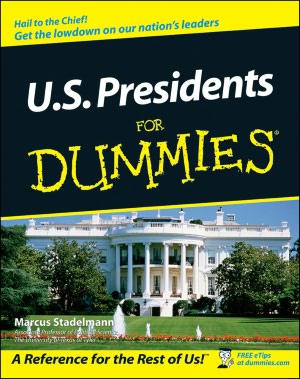Instead, I'm giving you the gift of information about the less-celebrated presidents. Everyone knows things about Washington, Jefferson, Lincoln, etc. But most people forget we even had a president named Pierce, or who followed up Woodrow Wilson. Obviously, who is "less-mentioned" and who is not is subjective, but let's just call this a sampler. (After all, I have to get back to my NaNoWriMo-ing sooner than later.)

Martin Van Buren, 8th POTUS (1837-1841) (Free Soil Party)
Is your lucky number eight? Van Buren's was, because he was the 8th VP and the 8th President of the US. (I know that's confusing, but the VP terms were confusing back then.) The "big thing" of his presidency was the Panic of 1837. His opponents blamed him for this economic hardship and referred to him as Marten Van Ruin.
Millard Fillmore, 13th POTUS (1850-1853) (American Party)
President Fillmore didn't have a Vice President throughout his entire term. He is consistently ranked as one of the bottom ten presidents (but to be fair, there have only been 44... nearly a quarter of them have to be the bottom ten on any given list). He co-founded the University of Buffalo. He was born in a log cabin like a certain tall-hat-wearing president but nobody seems to make a big deal out of it for Fillmore.
Franklin Pierce, 14th POTUS (1853-1857) (Democratic Party)
Frankie was referred to as a "doughface," which was the 1850s way of saying he was a Northerner with Southern sympathies. His VP, William R. King, died about a month after inauguration, and Pierce served the rest of his term VP-less.
Rutherford B. Hayes, 19th POTUS (1877-1881) (Republican Party)
The B stands for Birchard, which was his mother's maiden name. His election caused the Compromise of 1877, where the Democrats allowed Hayes to accept the Presidency, and Hayes allowed the end of the military occupation of the South. He served in the Union Army during the Civil War.
Chester A. Arthur, 21st POTUS (1881-1885) (Republican Party)
The A stands for Alan. He took over the presidency (after about 6 months as VP) when James A. Garfield - whose A stands for Abram - was assassinated. He did not get his own VP. He also fought in the Civil War.
Benjamin Harrison, 23rd POTUS (1889-1893) (Republican Party)
Benjie was the grandson of slightly better-known president William Henry Harrison. He is - so far - the only president to be the grandson of another president, and also the only one to be from Indiana. He died of influenza.
Warren G. Harding, 29th POTUS (1921-1923) (Republican Party)
Harding coined the phrase "founding fathers" when he used it at the 1916 Republican National Convention. He is lesser-known because it was his job to return things to normal after WWI, so he didn't shake up the country.
I feel like the rest of the presidents (from Calvin Coolidge onward) are fairly well-known because they're in more recent memory, so I'll stop there.
No comments:
Post a Comment